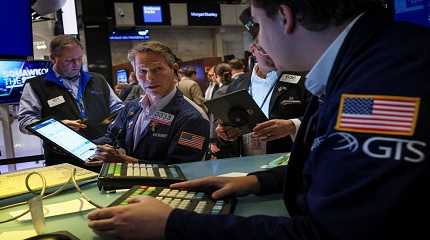
Dec 27 (Reuters) - The S&P 500 and tech-heavy Nasdaq fell on Tuesday, led by declines in some megacap growth stocks and Tesla, with optimism around China further easing its COVID-19 curbs limiting losses on the indexes.
Tesla Inc (TSLA.O) slid 5% after Reuters reported that the electric vehicle maker plans to extend a reduced production schedule at its Shanghai plant into January.
Megacap growth stocks Apple Inc (AAPL.O), Alphabet Inc (GOOGL.O) and Amazon.com Inc (AMZN.O) slipped between 1% and 2%, dented by a rise in U.S. Treasury yields.
The drops made consumer discretionary (.SPLRCD) and technology (.SPLRCT) the worst performers among major S&P 500 (.SPX) sector indexes.
China said it would stop requiring inbound travelers to go into quarantine starting Jan. 8, adding it would also downgrade the seriousness of COVID-19 as it has become less virulent.
U.S.-listed shares of Chinese firms such as JD.Com Inc , Alibaba Group Holding Ltd and Pinduoduo Inc (PDD.O) climbed between 4% and 5.4%.
Casino operators Las Vegas Sands Corp (LVS.N), Wynn Resorts Ltd (WYNN.O) and Melco Resorts & Entertainment Ltd gained between 2.2% and 4.7%.
China's move comes after three years of zero-tolerance measures battering the country's economy and follows an abrupt policy U-turn this month of dropping nearly all domestic COVID-19 restrictions.
"With China opening up and being less restrictive, the hope is that China will show an increase in GDP growth in 2023 - one of the few countries to actually show an increase in economic activity for the year ahead," said Sam Stovall, chief investment strategist at CFRA Research in New York.
With a handful of trading sessions left this year, investors are hoping for a so-called "Santa rally" at the end of what has been a largely disappointing month for U.S. equities.
The S&P 500 (.SPX) and the Nasdaq (.IXIC) have lost around 6% and 9%, respectively, so far in December and are on track for their biggest yearly loss since 2008 on worries that the Federal Reserve's aggressive policy tightening to tame decades-high inflation could trigger a recession.
Economic data so far has offered little hope that the Fed could hit the brakes on its interest rate hikes. Inflation has cooled further, but not enough to discourage the U.S. central bank from driving rates to higher levels next year.
Money markets are pricing in 59% odds of a 25-basis-point interest rate hike at the Fed's February meeting and expect rates peaking at 4.94% in May. .
Trading volumes remain thin as investors return from a long weekend.
At 9:39 a.m. ET, the Dow Jones Industrial Average (.DJI) was down 4.94 points, or 0.01%, at 33,198.99, the S&P 500 (.SPX) was down 14.55 points, or 0.38%, at 3,830.27, and the Nasdaq Composite (.IXIC) was down 87.26 points, or 0.83%, at 10,410.61.
Southwest Airlines Co (LUV.N) shed 5% after cancelling thousands of flights, piling more pressure on the S&P 500.
AMC Entertainment Holdings Inc (AMC.N) slipped 8.6%, extending declines after the cinema chain disclosed plans for a capital raise last week.
Declining issues outnumbered advancers for a 1.69-to-1 ratio on the NYSE and 1.93-to-1 ratio on the Nasdaq.
The S&P index recorded three new 52-week highs and one new low, while the Nasdaq recorded 33 new highs and 144 new lows.




